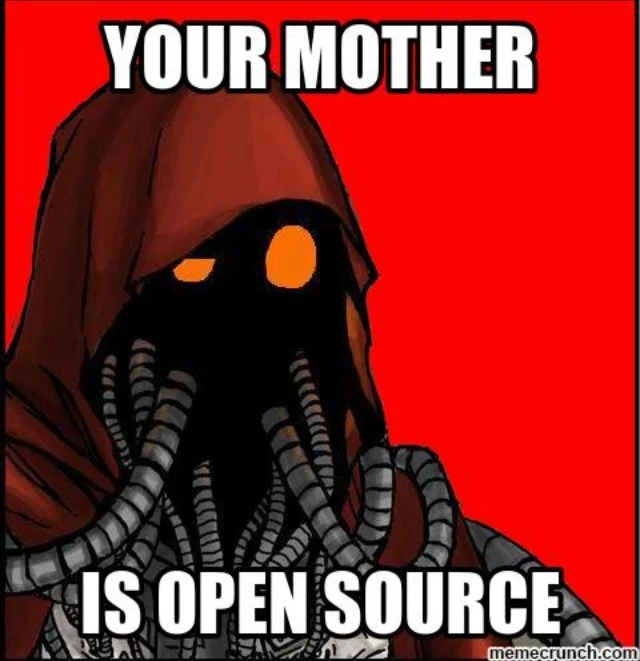I am definitely a fan. A lot of people say that flatpaks are bad because of sandboxing but I haven’t seemed to have any issues with it.
Although I do try to use dnf when a dnf package is available (I use fedora)
There are merits to using flatpaks. With flatseal application, you can fine-tune the permissions given to a certain flatpak application. The best thing is restricting internet usage.
i had a hard time getting used to them but now i love them in mint i can switch between the package version and flatpak version and usually the fp one is more updated
Mint took a while to handle flatpak decently in the update manager, and now it’s a nice experience.
On the other hand each flatpak uses >1Gb of disk where deb packages rarely require more than 100Mb
See, I only use flatpaks sparingly for this reason, but in some cases they’re indispensable when you don’t want an application to access certain parts of your system. The sandboxing is what makes them useful, in my opinion. For everything else, there’s the deb packages.
Plus I found on my install flatpak wasn’t cleaning up the flatpaks autoinstalled for older versions of nvidia drivers, they were all still listed as dependencies. Not sure who’s to blame but that was taking up a few much needed GBs.
I agree that flatpak should just invoke
flatpak uninstall --unusedright after uninstalling a flatpak. I don’t get why it doesn’t do this automatically. Granted, some distro package managers (used to) operate somewhat similarly in that they required theautoremoveoption.I actually tried
flatpak uninstall --unusedand it didn’t remove these ones. So there’s something odd going on there. My guess is maybe Mint manually installed them through the driver manager program? That’s a wild guess, I don’t know how it works.
That’s certainly a concern for some, but I’m using like 30 GB for all the things I’ve installed, which is a lot (12 (flatpak-system), 76 (flatpak-user)) but that’s on a 2 TB drive, which amounts to like 1½% of the total available space. I don’t think that’s a bad trade.
Lucky you. My laptop has a small HD, and all that space is a problem.
Compared to a pure install that can run on an electric toothbrush it’s a massive pill to swallow for some.
And not many consider the environmental impact of this either. Sure storage might be cheap (not in my country but I digress) but more space still requires more storage and across thousands of computers and then millions of computers that’s not an insignificant increase. We should be increasing technological efficiency not what were doing at the moment which seems to be just throwing more power and resources at the problems.
That’s not really true. It lists all the flatpak dependencies in that disk use, but a lot of those are shared, so they don’t actually use that much each if you install more than one, and the deb dependencies aren’t included at all. Flatpaks really do use more space, especially if you only have a small number of them, but it’s not as bad as that.
Nope, I was counting all dependencies, both for flatpak and apk installations.
No you weren’t. That would be ridiculous. The deb dependencies are most of your Linux install. Maybe counting just the new dependencies being installed alongside a typical deb install, but that’s still not an apples to apples comparison to 100% of all the flatpak dependencies, even ones shared with other flatpaks, and even that’s still very rarely over 1GB.
I used them for some things, but other things still don’t work quite right. Take Steam for example. I do love flatpaks for testing out apps, things with really finicky dependencies, or pinning a specific version of a software that I want to continue to work in the future. However, for most things, Arch + AUR just covers all my needs without any hiccups.
To me flatpaks are sort of like NixOS. All the benefits they provide aren’t something I need on a daily basis. Rolling back works just fine 99% of the time with
downgrade. I already have system backups. Despite what some articles might insist, things don’t just break all the time. I’m not running untrusted software.Basically no solution is perfect, but they don’t need to be. If the benefits I gain can be recreated through other methods without the tradeoffs they introduce, then I will go with that. Of course, that isn’t to say they don’t have their place, but sometimes I feel like some people think that “being designed from the ground up” to handle certain use cases is always better than whatever “cobbled together” thing we currently have and that isn’t always the case. I’m specifically quoting those two phrases because these are the exact phrases you will hear projects using to justify their existence. In fact, I would go so far as to say that some people have outright confused modularity for “cobbled together”.
One last example I want to make is that I make use of projects like the fish shell and helix editor. In these cases, I find the features they introduce to be worth the tradeoffs and work better because of being designed “from the ground up” to do what they do. However, I don’t make use of immutable systems, containers such as docker, or say filesystems such as btrfs. The features they provide are not useful enough to me compared to the problems they introduce.
I would be, but the promise is just broken. Let’s say you want to do the new cool thing and run Bazzite on your console gaming PC on your TV. Now you also want to watch videos that are any normal format these days or (GASP) HEVC like you could on an XBox. You install flatpak VLC because it “just plays everything” in your experience. Your experience is ruptured for both VLC and flatpak now. Flatpaks run on system .so’s actually sometimes and installing a Flatpak doesn’t mean an app “just works” like Mac or Windows…
I get the convenience, I really do, and works on every linux distro which is a plus, but I usually stay clear of them because of the bloat. Maybe that is a misconception on my part. I should preference that with the fact I use Arch (btw)…so AUR usually has everything I need.
FP and Electron both are brutal on limited storage, so being able to pick and choose where needed can be helpful.
It doesn’t even produce convenience versus just doing AUR package install, though! Nor does it actually containerize for security well! It is bloat alone with shit user experience!
Flatpaks together with “immutable” distributions, Wayland and systemd are a heresy, a crime against the UNIX principles, a disgrace in the eyes of of SED and AWK. REPENT! Save your immortal core dumps and return to the one true /home !
IDK why you’re being so rage baity. Its easy to avoid flatpaks if you dont like them. Only thing I’ve ever found as an obstacle was adding the binaries to my PATH so I can launch it with dmenu_run. Otherwise my package manager works well enough.
Bonus points: Write a PKGBUILD that installs flatpaks to /opt and symlink out binaries as needed.
Just a conversation opener, relax. Only one here shaking a fist in the air is you.
You don’t have to use a meme insulting some side to just start a conversation.
Well, I heard that people who use flatpacks are libs. True?
Sorry, I just think it’s funny that Linux users get so defensive about this stuff. You really felt insulted by this?
It was clearly trying to be insulting. I don’t understand why anyone would try to start a flamewar over flatpaks.
Flatpak have their own set of issues. One thing is, that Flatpak applications do not integrate that easily and perfect like a native package. Either rights are to given, you need to know what rights are needed and how to set it up. Theming can be an issue, because it uses its own libraries in the Flatpak eco system instead your current distributions theme and desktop environment.
But on the other hand, they have actually a permission system and are a little bit sandbox compared to normal applications. Packages often are distributed quickly and are up to date directly from the developers, and usually are not installed with root rights.
I’m pretty much a CLI guy as well and prefer native packages (Arch based, plus the AUR). But I also use Flatpaks for various reasons, alongside with AppImages.
It’s not my fault they make running apps from the cli so irritating. Broken by design. Even snaps work better.
My favorite part of the linux experience is the FREEDOM, but also being talked down to for not using my freedom correctly, I should only do things a specific way or I might as well just use windows.
Because using your freedom to promote options that restrict freedom means helping to remove your freedom. But hey, what do the Linux elders know? Clearly the new people into Linux are far smarter…
You don’t have to do as they say but doing so lets you talk down to others who aren’t. So it’s a fair trade.
It’s extremely context-dependent.
If we’re talking about enterprise-grade, five-nines reliability: I want the absolute simplest, bare-bones, stripped down, optimized infra I can get my hands on.
If we’re talking about my homelab or whatever else non-critical system: I’m gonna fuck around and play with whatever I feel like.
You are mixing different ideas of freedom. Software freedom is not the same as freedom of choice of software.
You don’t need Linux to have choices of what software to use, you have that in most (all?) proprietary systems, in some you might even have more choices than in Linux… even if it includes proprietary software.
This is analogous to how being a free person (not a slave) is not the same as having freedom to choose who to work for, even if some of them are slavers (ie. having freedom to choose your master).
They always seem to have some critical limitation. Handbrake is too slow via flatpak to work. Flatpak Zoom had no camera access. Flatpak-only Zen browser can’t use passkeys. Zen browser asks to be my default browser every time I open it, even though it is and I always say yes; is this a flatpak limitation? I don’t know, and I’d prefer not to have to figure it out just for some theoretical benefits and more overhead.
Flatpak Zen Browser is never asking me to be the default. Maybe it did in the beginning but I don’t remember.
Maybe you checked “stop asking”?
Probably but I think if the original comment wanted the message to disappear they would also have done that.
No, I wouldn’t. It’s how I can tell if the setting actually took!
Is there no other way on your system to see what the default browser is? On Gnome you can see a few of your default applications in the settings. And what happens if you open an html file for example? Does it open in Zen? If yes then it appears that Zen is set as your default browser, what more is there to check?
Flatpak Zoom had no camera access.
I used Flatpak Zoom for all my job interviews recently. Camera and mic worked flawlessly.
Well that’s frustrating. I may need to check that again.
I like the sandboxing of Flatpak, but I prefer AppImage as I don’t like having the Flatpak runtime requirement.
Don’t AppImages also have a similar requirement just with stuff that is already installed on many popular distros so many people just don’t notice it? I think I read somewhere that running AppImages on systems that even slightly differ from the big popular distros is a pain since you still have to ship this stuff with them but it is more cumbersome than with flatpaks.
That is technically true with things like glibc, but I’ve never seen a system that did not already include baseline packages.
I prefer Arch Linux’s use of flatpaks, which is none at all ever
Me pretty much only ever using arch Linux: “what the fuck is a flatpak”
I once had to install Firefox into wsl (Ubuntu) and I wanted the kms on the spot.
But maybe it’s not that bad for newer people to get started with Linux.
Joke’s on you, I use Flatpaks on Arch
Why, it’s totally unnecessary.
Mostly because of detailed and easy permissions, and also because I have other distibutions on my other computers and want my programs to be consistent everywhere - same programs, same version.
i have a couple on arch also, mostly because of dependency issues breaking the program and it being a pain in the ass to fix
Which ones? Everything in the arch main repos are compiled for your system, and most things in the AUR can either be built from source, or have -bin installs.
aleph one from the AUR refused to run properly, often crashing on startup so i just grabbed the flatpak
the weirdest one was ghostwriter from the official repos, for some reason one day the preview window showed heavily corrupted output and tinkering with it on and off for a week did nothing, including a complete purge and reinstall of the program
the flatpak was the only version of it that worked after that
i like it. they are very convenient, work every time, and solves the distribution problem.
I like them as an option, there are some programs like Bottles or specific game launchers that work under flatpak better than the versions available via native package manager (with Bottles in particular, you can use various built-in sandbox features via flatpak which makes things a bit more secure), but it’s also a bit of a pain because it’s an additional package manager you have to update separately now, or tweak if things go wrong.






















